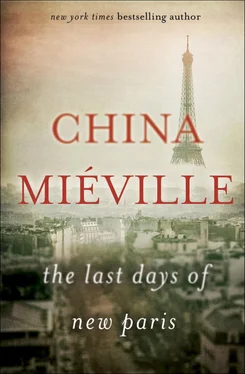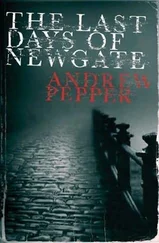Thibaut considers his dead, in the forest. He considers the ruined plan, the assault from which he exiled himself.
From his bag he pulls out a pencil and a stained old schoolbook, folded many times. He opens his war notebooks.
I’m not a fucking deserter. The mission is vacant. I’m not a deserter.
Thibaut was nearly seventeen when, following survivors’ stories and the noise of shots and burnt and uncannily twisted remains of German patrols and the intuitions that sometimes beset him, he tracked down the Main à plume in the ruins.
He was waving scrappy publications at them as he came, trembling so hard with nerves that he made the selectors who met him and ushered him into their compound laugh, not unkindly.
“This is you, isn’t it?” he kept saying, pointing at the pages, the names. They kept laughing when he told them, “I want to join you.”
They tested him. When he said he couldn’t shoot—he’d not yet held a gun—they joked that he’d have to try automatic shooting. Like automatic writing, they said. “You know who it was said the simplest act of Surrealism is to fire randomly into a crowd?” He did, and they liked that.
Other examinations. They pointed at certain objects from the junk that filled their cellar, asking him if they were surreal or just trash. Thibaut looked at the configurations and muttered answers too quickly for thought—a claw-and-ball chair leg was nothing, an empty cigar box and a hairbrush were surreal, so on. He corrected himself only once, over what he could never later remember. They looked at him more thoughtfully when he was done.
When one of the questioners took off his shoe to rub his toe, with boldness not yet characteristic Thibaut took it from the surprised man, picked up a candlestick he had previously dismissed as mere object and placed it inside the old leather. “Now it’s surreal,” he said. The glances of the selectors—artists, clerks, and curators turned guerilla—had not escaped him.
“You want to fight, I understand,” the half-shod man said, looking at him sideways. “Right now, though… with all this… why like this ? Why with us? With the city like this, don’t we have greater needs than poetry?”
Immediately Thibaut almost shouted a response. “‘We refuse to flee poetry for reality,’” he said. “‘But we refuse to flee reality for poetry.’” The men and women blinked at him. “‘No one should say our actions are superfluous,’” Thibaut recited. “‘If they do, we’ll say the superfluous supposes the necessary. ’”
He had recognized the question, the last test. It, and his answer, were the words of Jean-François Chabrun, speaking for the franc-tireurs, Surrealist irregulars, left in Paris when the Nazis came. A prophecy, a promise written after one cataclysm and just before another. They had carried it over after that next, the S-Blast, and Thibaut granted it fidelity.
He will never be a sharpshooter. He is an adequate hand-to-hand fighter at best. Thibaut was admitted to the Main à plume because of his way of seeing, the connections he makes, the synchronicity he notes and invokes. They taught him to conduct what they called disponibilité, to be a receiver. To tap objective chance.
In rooms at the top of leaning houses, in a city become free-fire zone and hunting grounds for the impossible, Thibaut learned survival and poetry, from Régine Raufast, Edouard Jaguer, Rius, Dotremont, Chabrun himself, techniques he would take with him later, when training was done, full of thanks and solidarity, to spread the resistance, to join with others, and recruit. In his company, Jacques Hérold set a black chain on fire.
In the post-blast miasma, all Parisians grew invisible organs that flex in the presence of the marvelous. Thibaut’s are strong.
The Surrealists trapped behind had known immediately what the newly appeared figures were that the explosion had brought. Not the devils, those tawdry bugbears: them they considered as little as they could. But the others, they knew. They were the first to recognize them, to try to develop a strategy for life and for urban war that afforded them respect. The Main à plume owed them, not obedience, but a kind of fealty: this was hardly the hoped-for insurrection, but these were Surrealist glimmers, these manifs. They were convulsively beautiful, and they were arrived. The poets and artists and philosophers, resistance activists, secret scouts and troublemakers, had become, as they must, soldiers.
Now, alone, Thibaut drinks to the freedom of Paris from a standpipe in a square full of bricks like failed flowers.
Months ago, his scouts in the ninth reported demons in a charnel-house off Clichy. Thibaut and the comrades of his cell had looked at each other in horror.
“They’re not with Nazi handlers,” Virginie said. She was a recent recruit to the Surrealist resistance, ferocious but young and ignorant. “They’re feral. How urgent is it? Do we have to…?”
“You’ve not dealt with them before,” Thibaut said. “Or you’d know.”
The thing was, he told her, you could no more accommodate devils than you could a splinter gone septic, an allergic reaction. The power of the arrondissement had kept them out, so far, but for occasional lumbering, blundering intruders. But now they had established themselves, if they were not driven out or destroyed, they would transform the ninth into a zone of blood and infernal agony. The Surrealists had to prepare an exorcism.
There was a pleasure in some of the process and accoutrements, relics of wizardry that had embarrassed the Enlightenment. Other necessities, though, stank of clericalism, and the partisans were disgusted that they were efficacious. It was with distaste that Thibaut and Élise took a bag of crucifixes, bottles of holy water, bells, to Father Cédric. Élise made a joke—she, the rabbi’s granddaughter, carrying such things. The old priest performed desultory benedictions and they paid him in cigarettes and food.
“Turn the other cheek, Father,” said Élise at his expression. “Find some Free French if you want willing sheep to patronize. Until then, this is a marriage of inconvenience. You want to walk? There’s the door.”
He was safer in their company, and they in his. An uncomfortable symbiosis. The Surrealists despised his calling, and he them for their militant atheism, but everyone knew it helped to have a priest perform certain absurdities of his trade if it was demons you had to fight.
“Why?” Thibaut asked Élise when they left again. “Why do you think it does work? It’s not as if any of this stuff is true. ”
“Maybe devils love ritual as much as people do,” she said.
However they might mock and bully him, Thibaut’s crew had a degree of unfriendly respect for Cédric: whatever else the man was, he was Resistance. In these streets, his very tradition had become unlikely dissent. Unlike so many clergy, he had refused to make any peace at all with the new Church of Paris, or with its leader, Robert Alesch.
For months before the reconfiguration, the Abbé Alesch had been a well-known preacher against the Nazis. A very few intimates had known, too, that he worked as part of Jeannine Picabia’s clandestine network, réseau Gloria. He’d been courier and confidant, able, as a priest, to pass through the zones, carrying messages and contraband. His Gloria comrades called him “Bishop,” and he heard their confessions.
He was a double-agent. In the S-Blast’s aftermath, he had sold his comrades to his Nazi paymasters, and almost every one of them had died. Alesch, V-man, informer, paid not thirty pieces of silver but twelve thousand francs a month.
Читать дальше













